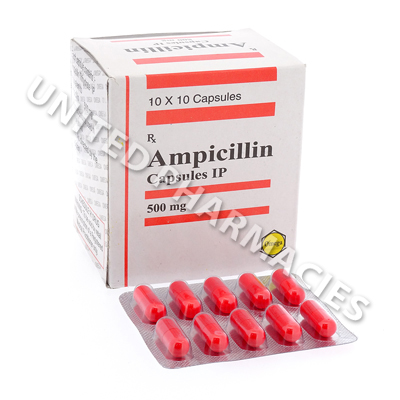Customers also like
Ampicillin (Ampicillin) - 250mg (10 Capsules)
from only £2.73
Campicillin (Ampicillin) - 500mg (10 Capsules)
from only £2.84
Azee 1000 (Azithromycin) - 1000mg (1 Tablet)
from only £3.06
Flagyl (Metronidazole) - 200mg (15 Tablets)
from only £1.17
Description
| Main Use | Active Ingredient | Marketed Name |
| Bacterial infections | Ampicillin | Ampicillin |
Uses
Ampicillin (Ampicillin) exhibits bactericidal activity and it is suitable for many infections caused by a considerable amount of both gram positive and negative bacteria. Susceptible strains of bacteria include enterococci, Shigella, E. Coli, staphylococci, streptococci, Streptococcus pneumonia, P. Mirablis and various others. Patients have been treated with it for bacterial infections of the respiratory, gastrointestinal and genitourinary tracts. Other conditions it has been used for include gonorrhoea, bronchitis, pneumonia, otitis media, sinusitis as well as other infections not listed in this paragraph.
The main ingredient in this antibiotic is in the penicillin group of antibiotics, and is regarded as a beta lactam. However, it is different form penicillin G. When administered, it is absorbed from the gastrointestinal tract, after which it starts to work against the bacteria. By irreversibly inhibiting the bacterial enzyme called transpeptidase, it helps to disrupt the process in which the bacteria synthesize their cell walls. This results in cell wall lysis and causes the eventual destruction of the bacteria.
Dosage and Administration
Ampicillin (Ampicillin) capsules each contain 500mg of the main ingredient. In some cases, doctors will direct adults who are undergoing treatment for bacterial infections of the gastrointestinal or genitourinary tract to administer 500mg 4 times per day, with each dosage evenly spaced out at 6 hour intervals. Other conditions may require a different dosage. The duration of time for which treatment will be required to continue will differ for each individual based on how the infection responds to the antibiotic. Treatment is generally required to continue until the entire course of medicine is finished, even if symptoms appear to have improved before all the medicine has been taken. Follow the instructions given by your doctor.
Side effects
Patients should take note of the fact that Ampicillin (Ampicillin) could cause some side effects, which may include:
- Vomiting
- Flatulence
- Loose stools
- Bloated sensation
- Discomfort of the stomach
All side effects, even if only mild, must be reported to your doctor. Serious adverse events which will require medical treatment straight away include bruises on the body, feelings of weakness, severe diarrhoea which is also bloody, blisters visible on the skin, strange behaviour and other serious side effects that have not been listed here.
Precautions
Antibiotic medications such as this one are only active against bacteria. They will not exhibit any activity against viruses, and for this reason, antibiotics are only used for bacterial infections.
Patients who are undergoing prolonged treatment with this medicine may be ordered to undergo certain medical tests by their doctor, to ensure that no harmful effects are occurring as a result of taking the medicine.
Seek immediate emergency medical attention if you suffer an allergic reaction. Symptoms to watch for, which may be indicative of a reaction, include skin rashes, hives, swelling of the face or limbs, trouble breathing, and trouble swallowing.
Always use Ampicillin (Ampicillin) as you have been prescribed by your doctor. Never self-medicate or change your dosage without first consulting your doctor. The correct dosage can vary depending on your health, medical history, and the severity of the condition being treated.
This medication may not be safe for all patients. Before you begin using it always disclose the following to your doctor:
- If you are pregnant or breastfeeding.
- If you suffer from any allergies.
- If you suffer from any other health conditions or illnesses.
- If you are using any other medicine (including all non-prescription).
- If you are using any supplements, vitamins, or herbal products of any kind.



-Caps-250mg-UK-2s.jpg)
-Cap-500mg-UK-1s.jpg)
-Tab-1000mg-UK-1s.jpg)
-Tab-160mg-800mg-UK-1s.jpg)
-Tab-500mg-125mg-UK-1s.jpg)
-Tab-200mg-UK-1s.jpg)





